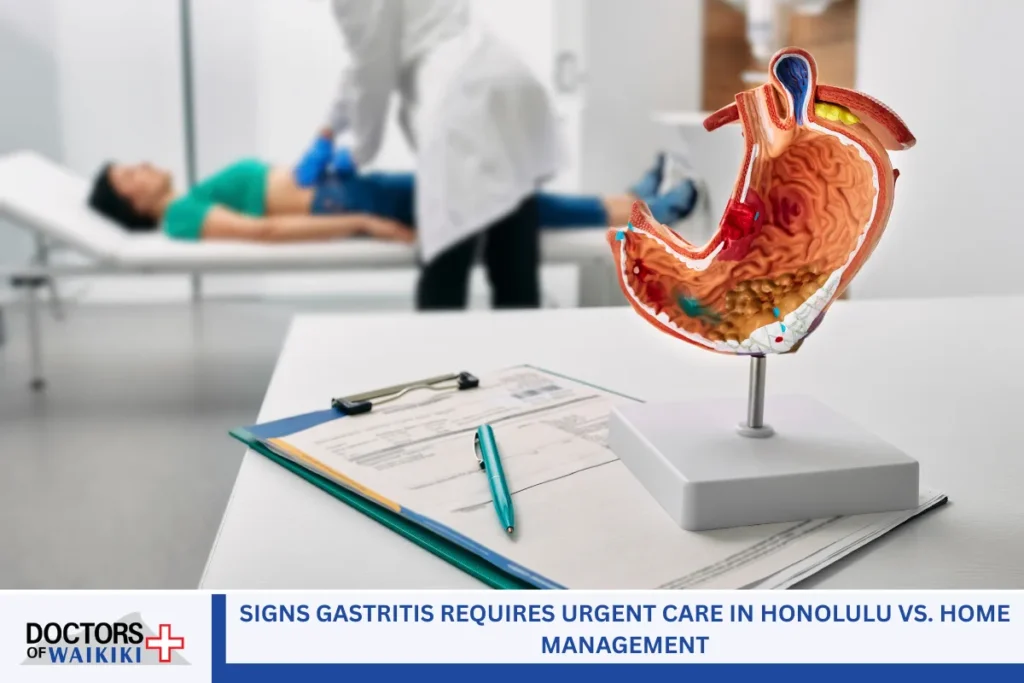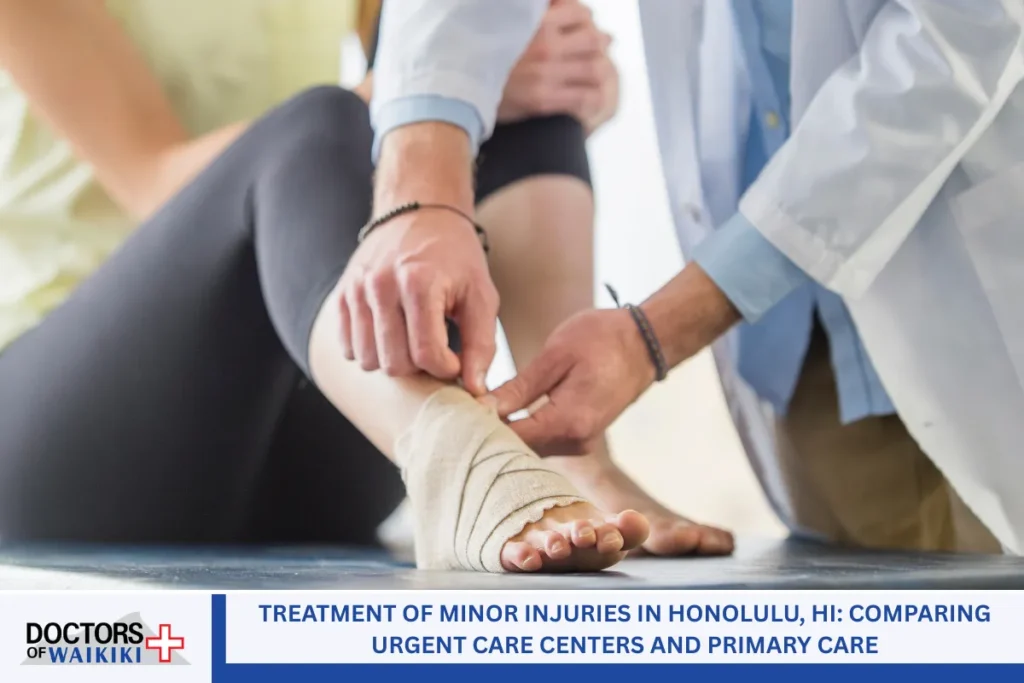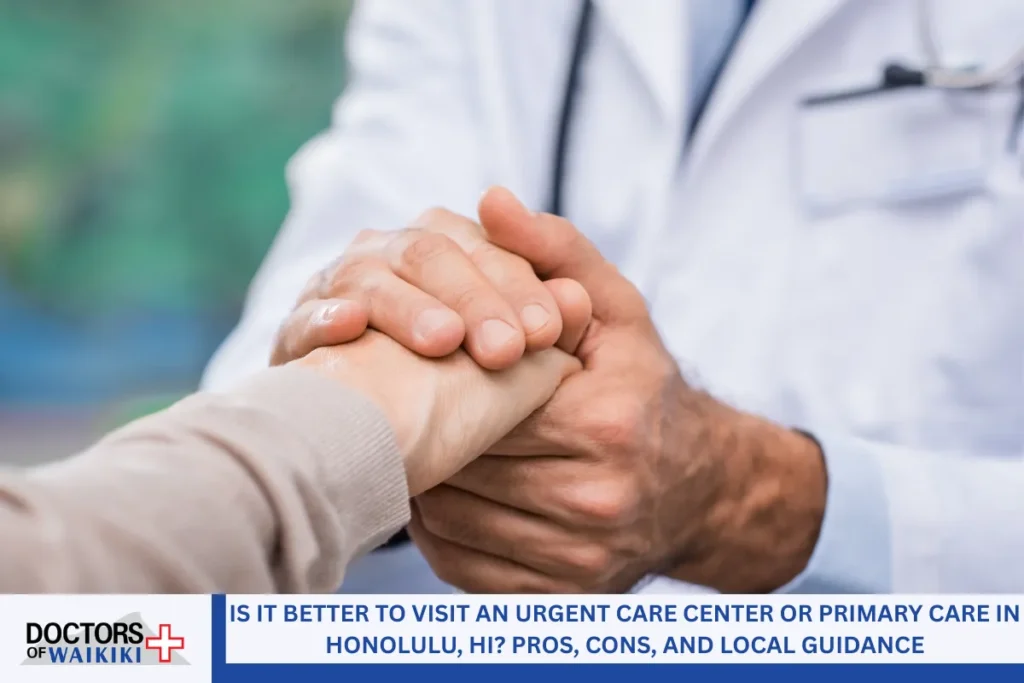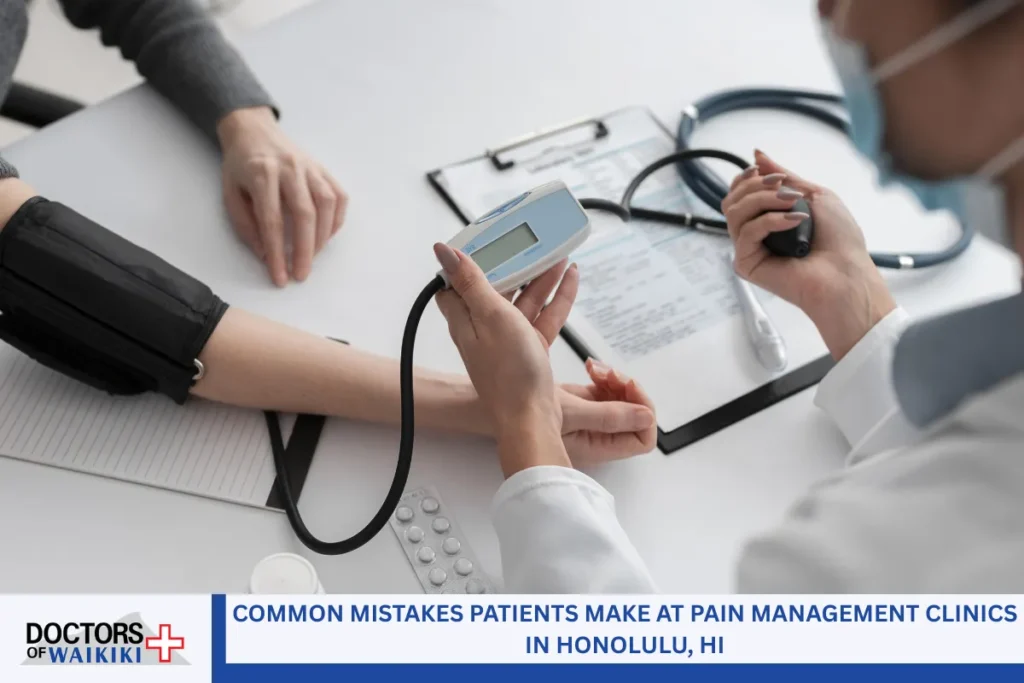You’re not feeling right. You may have a lingering sore throat, a painful ear, or a sharp burning when you use the restroom. You’ve tried resting, staying hydrated, and even some over-the-counter relief, but nothing works. You might be wondering, “Is it time for antibiotics?” And more importantly, “Where do I go to get checked out fast?”
The answer for many people in Honolulu is a trusted urgent care center!
These modern walk-in clinics provide timely, professional treatment for infections and symptoms that can’t wait for your primary care physician to be available. You don’t need an appointment and won’t spend hours in a crowded Emergency Department for a non-life-threatening issue.
In this article, you’ll learn how to recognize the warning signs that signal the need for antibiotic treatment, what services urgent care clinics offer, and why they’re one of the most practical options for common illnesses in Hawaii.
What Are Antibiotics and When Do You Need Them?

Antibiotics are medications used specifically to treat bacterial infections—not viral ones. They’re essential tools in medicine, helping people recover from infections that, if left untreated, could lead to serious health issues or hospitalization.
But antibiotics aren’t a cure-all. Taking them when you don’t need to (for example, during viral illnesses like the common cold or most respiratory infections) can do more harm than good. Overusing antibiotics leads to antibiotic resistance, where bacteria no longer respond to treatments that once worked.
Antibiotics are often required for:
- Strep throat, confirmed by a throat swab
- Urinary tract infections (UTIs)
- Bacterial sinus infections
- Infected minor injuries or wounds (including skin issues)
- Ear infections with discharge or persistent pain
- Eye infections like bacterial conjunctivitis
A visit to an urgent health care clinic allows you to get assessed by healthcare professionals, who can decide whether antibiotics are necessary, and which type is best for your condition.
How Urgent Care Centers Evaluate Infections Quickly and Effectively
Modern urgent care centers in Honolulu are built for speed and accuracy. They’re equipped to diagnose infections and deliver prompt treatment within a single visit. Whether you’re a resident or visitor, this is a huge advantage when your symptoms can’t wait for your regular doctor.
Here’s what they offer on-site:
- Urine tests to diagnose UTIs
- Blood tests to detect infection or inflammation
- Throat swabs to identify strep throat
- Visual and physical exams for skin infections
- Ear, nose, and throat evaluations for sinus infections and ear infections
Unlike waiting days to see your primary physician, urgent care provides same-day medical service. You’ll leave with a clear diagnosis and either a prescription for antibiotics or reassurance that your condition doesn’t require them.
Top Signs You Should Visit an Urgent Care Clinic for Antibiotics

Knowing when to seek care is just as important as knowing where. Many patients delay getting help because they think their symptoms will go away, or they aren’t sure if it’s “serious enough.” But in many cases, waiting too long can lead to complications, especially with bacterial infections.
Here are the top signs that you should head to an urgent care center for a medical evaluation—and potentially, antibiotic treatment:
1. Your fever won’t go away
It could indicate a bacterial infection if you’ve had a fever over 100.4°F for more than 72 hours, especially with other symptoms. Fevers that last or spike repeatedly are red flags your immune system is fighting something that may need medication to resolve.
2. Painful urination or blood in urine
These are common symptoms of an Urinary Tract Infection. UTIs won’t typically go away on their own and can progress into kidney infections if left untreated. Urgent care clinics can perform quick urine tests and prescribe antibiotics immediately.
3. Facial pressure with thick nasal discharge
While many sinus infections start from viruses, bacteria might be the culprit when symptoms last more than 10 days or worsen after initial improvement. Facial tenderness, headaches, and yellow-green mucus are all signals.
4. Swollen lymph nodes and a raw throat
You could have strep throat if your throat is sore and accompanied by visible white patches or swollen glands. This infection spreads easily and needs antibiotics. A rapid strep test at urgent care can confirm it in minutes.
5. Red, hot, or draining wounds
A cut or scrape that becomes increasingly swollen or painful or produces pus might be infected. This is especially urgent if redness spreads from the area or you’ve had minor burn injuries recently.
6. Persistent ear pain or fluid drainage
Ear infections can develop quickly, particularly after colds or allergies. If the pain lasts or you experience drainage, it’s time for medical evaluation. Urgent care providers can assess your ear canal and recommend proper treatment.
7. Your symptoms return after improving
This is known as a secondary infection. Suppose you felt better, but symptoms like stomach pains, fatigue, or coughing return stronger. In that case, it might mean the initial illness opened the door to bacteria—something an urgent care provider can help identify and treat.
Don’t ignore these signs. Visiting a walk-in clinic early could mean fewer complications, faster relief, and avoiding a future trip to the Emergency Department.
Why Urgent Care Beats the Wait for Primary Care in Honolulu
Ideally, we’d all have immediate access to our primary care physician. But here in Honolulu, wait times can stretch days or weeks—especially during flu season or local outbreaks.
When you’re in discomfort and unsure what’s wrong, time matters.
Urgent care centers:
- Operate 7 days a week, including evenings and holidays
- Offer same-day care for primary care concerns
- Treat common illnesses and minor injuries without appointments
- Are faster, more affordable alternatives to hospitals for non-life-threatening conditions
Whether you’re a resident or visitor, you shouldn’t wait days to see a doctor for something that needs treatment today.
Types of Infections Treated at Urgent Care Clinics
Urgent health care centers are well-equipped to diagnose and treat various infections. These aren’t just limited to one area of the body—they cover several systems.
Here’s what they commonly treat:
- Respiratory infections with suspected bacterial causes
- Skin infections (cuts, abscesses, cellulitis)
- Urinary Tract Infections
- Eye infections (pink eye, styes)
- Ear infections and Eustachian tube blockages
- Dental-related infections (depending on the clinic)
They may not perform complex surgeries, but they provide high-quality care for infections requiring antibiotics and do it quickly.
When Not to Visit Urgent Care: Know the Red Flags

There are times when your symptoms are too dangerous for urgent care. These situations require the expertise and equipment of a hospital emergency department or trauma center.
Head to the ER if you experience:
- Chest pain or pressure that could signal a heart attack
- Sudden stroke symptoms like confusion or slurred speech
- A head injury with vomiting or unconsciousness
- A broken bone with visible deformity or open wounds
- Severe vaginal bleeding
- Severe dehydration causing confusion or fainting
- High fevers in babies under 3 months
These life-threatening emergencies demand more emergency care than any urgent care clinic can provide.
What to Expect from Antibiotic Care at an Urgent Care Center
Once your urgent care provider confirms a bacterial infection, they’ll prescribe the appropriate oral or IV antibiotic, depending on severity.
Some clinics offer:
- On-site pharmacies
- IV fluids for dehydration or infection-related fatigue
- X-rays and lab services to confirm complications
- Aftercare instructions and return visits if needed
You’ll also get clear guidance on when to return, what side effects to watch for, and how to safely recover at home.
Understanding Costs, Insurance, and Billing for Antibiotic Treatment

Urgent care clinics are generally much cheaper than ERs. Most accept health insurance, including local and national providers. That means your copay is often less than $100, and out-of-pocket fees for uninsured patients are usually between $100 and $250, depending on the services provided.
Ask about:
- Balance billing (what’s covered vs. not)
- Flat-rate options for tourists
- What your insurance plan includes (e.g., labs, follow-ups)
Everything is typically explained clearly upfront—no surprise charges or confusing bills later.
Tips to Make Your Visit Smoother and Faster
To speed up your visit and help providers treat you efficiently, here’s what to do:
- Bring your insurance card and ID
- Know your medical history and any allergies
- Write down your symptoms and how long you’ve had them
- Bring a list of medications or supplements you’re taking
- Ask about the availability of walk-in services ahead of time
A little preparation can mean faster diagnosis and effective treatment.
Taking Control of Your Health with Timely Antibiotic Care

When you’re sick, the last thing you want is to wait, wonder, or get worse. The reality is that some infections need help to clear up, and the longer you delay, the higher the risk of complications. Visiting an urgent care center ensures you’re seen quickly and treated appropriately.
Don’t second-guess your symptoms. If your body’s telling you something isn’t right, it’s time to listen. A trusted urgent care clinic in Honolulu can give you answers, relief, and the care you need to start healing.
Honolulu Urgent Care Center – Doctors of Waikiki

Doctors of Waikiki is a state-of-the-art walk-in clinic in Hawaii that offers comprehensive medical care to locals and visitors. We specialize in urgent care, minor surgeries, and general medical services, ensuring quick and efficient treatment. Our services include immigration medical examinations, health screenings, and green card medical exams, making us a trusted choice for those requiring USCIS medical exams.
We are dedicated to your health and well-being and are committed to providing top-notch care. We are also open 7 days a week (including all holidays). And most of our staff are bilingual. Call us today at (808) 922-2112 to get the care you need—fast!
FAQs About Antibiotic Treatment at Urgent Care Centers
Can urgent care treat bacterial infections or just minor illnesses?
Yes, urgent care facilities are equipped to treat minor and more serious bacterial infections that don’t require complex emergency care. These centers offer a wide range of urgent care services, including diagnosing and treating infections like middle ear infections, UTIs, and skin abscesses. If you’re experiencing symptoms such as abdominal pain, fever, swelling, or pus, you’re likely dealing with harmful bacteria that require antibiotics—not just rest or over-the-counter medications.
Urgent care doctors will use diagnostic tests, such as urine analysis, throat swabs, or basic lab work, to determine the exact type of bacteria causing your illness. Based on these findings, they’ll create a tailored treatment protocol using appropriate medications, often antibiotics. These clinics are ideal for non-urgent conditions that still demand timely treatment, helping you avoid the ER’s high cost and wait times while still receiving comprehensive care.
What types of infections and conditions do urgent care doctors treat with antibiotics?
Urgent care physicians commonly treat bacterial infections requiring prompt but not emergency-level care. These include:
- Respiratory conditions like bacterial bronchitis or pneumonia
- Skin infections such as cellulitis, infected wounds, or minor scrapes
- Urinary tract infections with pain or blood during urination
- Middle ear infections causing pain, swelling, or fluid discharge
- Infections from non-emergent injuries that have worsened over time
These are common infections where urgent care visits can provide quick medical treatment. They also handle minor illnesses that might turn serious if not properly managed. If you’re unsure whether your symptoms are viral or bacterial, a healthcare provider at an urgent care location can perform diagnostic tests and provide the correct treatment options.
It’s important to know that antibiotics won’t help with a viral illness, like a cold or the flu. That’s why accessing accessible treatment options guided by experienced doctors is crucial.
Why should I choose urgent care over my primary care provider or the ER?
Choosing the right place for medical treatment depends on your symptoms and timing. If your primary care doctor is unavailable or booked for weeks, urgent care offers convenient care without needing a prior urgent care appointment. Most urgent care locations allow walk-ins and are open evenings and weekends—perfect for sudden symptoms that don’t warrant the ER but can’t wait for your primary care provider.
Here’s how they compare:
- Primary care provides ongoing care and chronic disease management.
- Urgent care bridges the gap with same-day visits and treatment of non-urgent conditions.
- Emergency rooms are reserved for severe trauma or complex emergency care.
Whether you’re dealing with flu symptoms, muscle pains, or a possible infection, urgent care services offer faster access, lower costs, and expert medical guidance, making them a smart option for many medical concerns that need quick attention but not hospitalization.
Can I get antibiotics for a viral infection at urgent care?
No, and you shouldn’t. Urgent care doctors will not prescribe antibiotics for viral infections—and that’s good. Antibiotics only work against types of bacteria; they don’t treat viruses like those that cause the common cold, runny nose, or flu. The overuse of antibiotics can lead to serious consequences, such as antibiotic resistance and allergic reactions.
That said, urgent care physicians are trained to distinguish between viral illnesses and bacterial ones through physical exams and diagnostic tests. If your symptoms stem from a virus, they may suggest other treatment options like anti-inflammatory drugs, fluids, rest, and over-the-counter medications to manage discomfort.
For respiratory conditions, sinus pressure, or coughs, it’s especially important to get evaluated. While you may think antibiotics will help, only a proper diagnosis can determine if bacteria cause your infection. That’s where urgent care services provide responsible and efficient medical guidance.
Does health insurance cover urgent care, or will I pay out of pocket?
Yes, most urgent care clinics accept various health insurance plans. Depending on your insurance plan, you’ll typically pay a lower copay than at an Emergency Department. Coverage often includes:
- IV antibiotic treatment
- Lab tests and imaging
- Physician evaluations
- Short-term medical service for non-emergencies
Be aware of your insurance’s balance billing policies. Some clinics may charge extra if they’re out-of-network, so it’s smart to call ahead and confirm.
If you’re uninsured or paying out of pocket, urgent care still offers a more affordable alternative to the ER. Fees are transparent, and many urgent health care clinics list pricing online. For example, treating a minor burn or simple infection or conducting X-rays at urgent care might cost between $100–$300—far less than the ER’s starting fees.
If you’re unsure about coverage, bring your insurance card and ask the front desk about options for payment at the current time of service.
Read: Urgent Care Center vs. ER: Where to Go for IV Antibiotics











